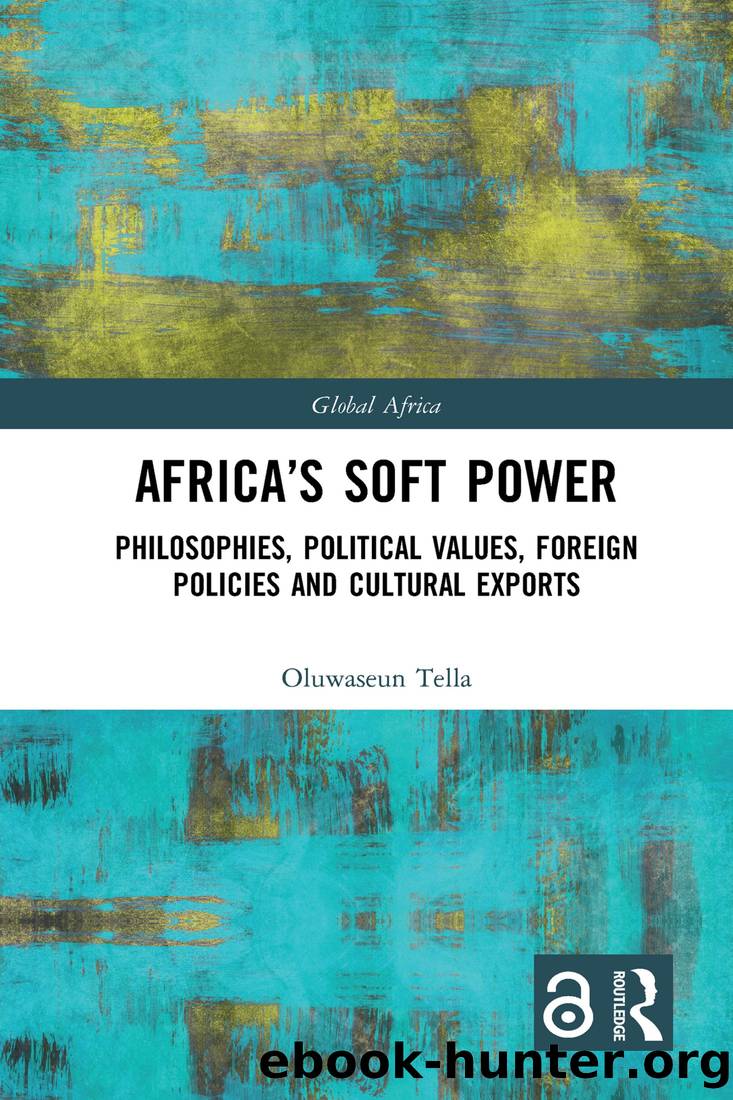Africa's Soft Power: Philosophies, Political Values, Foreign Policies and Cultural Exports by Oluwaseun Tella

Author:Oluwaseun Tella [Tella, Oluwaseun]
Language: eng
Format: epub
Tags: Ethnic Studies, African Studies, African, Social Science, Political Science, World
ISBN: 9781000402179
Google: j2BCEAAAQBAJ
Goodreads: 56446575
Publisher: Routledge
Published: 2021-05-23T06:14:41+00:00
Double standards on human rights and the democracy promotion shortfall
Pretoriaâs soft power has also been punctured by its inconsistencies on human rights issues. While this has been exacerbated in recent years due to the stateâs cosy relations with China, it has been a feature of South Africaâs post-apartheid foreign policy even during Mandelaâs years. For example, despite its poor human rights record, South Africa had friendly relations with the autocratic Suharto regime in Indonesia with Mandela visiting Indonesia in 1997 and Suharto undertaking a state visit to South Africa in the same year. In addition, Pretoria supplied weapons to the regime, notwithstanding the possibility of Indonesia using them in the occupied East Timor (Tella, 2018b). While serving as a non-permanent member of the UN Security Council between 2007 and 2008, the African regional power voted against resolutions that condemned human rights violations in Sudan, Zimbabwe, Iran, and Myanmar on the basis that the West was selectively targeting these states or bypassing UN structures and rules (Habib, 2009). Thus, South Africa departed from the ideals of human rights it claims to represent, which runs contrary to its historical struggle against apartheid, to the chagrin of the international community.
Pretoriaâs voting behaviour while serving as a non-permanent member of the UN Security Council and its activities at the United Nations Human Rights Council (UNHRC) have further revealed the gap between its rhetoric and action on human rights issues (Hengari, 2018). In the UNHRC, Pretoria abstained from voting on a resolution to set up an international tribunal to prosecute the suspects responsible for the killing of former Prime Minister of Lebanon, Rafiq Hariri, and in 2016 Pretoria voted against a resolution to protect human rights on the Internet (Hengari, 2018). As Hengari notes: âThe crisis in its human rights diplomacies undermines its real and perceived normative leadership in Africa and the Global South, as well as its role as a bridge-builderâ (2018: 5).
In its ostensible claim for African solutions to African challenges, South Africa turned a blind eye to human rights abuses in states such as Zimbabwe and Sudan. Despite Zimbabweâs notoriety for human rights abuses under Mugabe, South Africa opposed the countryâs suspension from the Commonwealth in 2002. In the case of Sudan, Pretoria did not fulfil its international obligation as a signatory to the ICC when it failed to arrest Al-Bashir during the AU summit in 2015 in South Africa. Indeed, after the summit, South Africa went on to solidify its relations with Sudan by signing 16 bilateral agreements to the consternation of the ICC (Tella, 2018b). Due to the fact that South Africa was the first African state to adopt the ICC statute in its domestic law in 1998 and its image as a beacon of human rights and the defender of international law, the decision not to arrest Al-Bashir shattered these images, at least in Western eyes. South Africaâs commitment to African solutions to African challenges at the expense of human rights was challenged by its support of UN Resolution
Download
This site does not store any files on its server. We only index and link to content provided by other sites. Please contact the content providers to delete copyright contents if any and email us, we'll remove relevant links or contents immediately.
Collaborating with Parents for Early School Success : The Achieving-Behaving-Caring Program by Stephanie H. McConaughy; Pam Kay; Julie A. Welkowitz; Kim Hewitt; Martha D. Fitzgerald(906)
Entrepreneurship Education and Training: The Issue of Effectiveness by Colette Henry Frances Hill Claire Leitch(673)
Adding Value to Policy Analysis and Advice by Claudia Scott; Karen Baehler(499)
Materializing the Middle Passage by Jane Webster;(498)
Race and American Political Development by unknow(490)
American Government and Politics Today by Steffen W. Schmidt Mack C. Shelley Barbara A. Bardes(488)
Sociological Perspectives of Health and Illness by Constantinos N. Phellas(487)
Human and Global Security : An Exploration of Terms by Peter Stoett(474)
Control Of Oil - Hardback by Kayal(470)
The Disappearance of Rituals: A Topology of the Present by Byung-Chul Han(410)
The Catholic Church and European State Formation, AD 1000-1500 by Jørgen Møller(403)
Advances in Child Development and Behavior, Volume 37 by Patricia J. Bauer(403)
The World According to China by Elizabeth C. Economy(387)
Theories of Counseling and Psychotherapy: A Case Approach by Nancy L. Murdock(381)
Left Is Not Woke by Susan Neiman(371)
Application of classical statistics, logratio transformation and multifractal approaches to delineate geochemical anomalies in the Zarshuran gold district, NW Iran by unknow(371)
Cross-Cultural Child Development for Social Workers by Lena Robinson(359)
Turkey's Relations with the West and the Turkic Republics: The Rise and Fall of the Turkish Model by Idris Bal(356)
Japan's Ainu Minority in Tokyo by Mark K. Watson(341)
